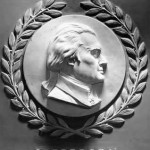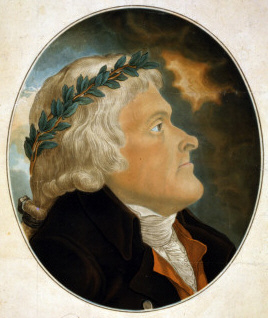Peace and Safety For Your Twentieth of November: Thomas Jefferson’s Personal Outline of Epicurean Philosophy
Peace and Safety to the Epicureans of today, no matter where you might be!
 Earlier this week I posted a new topical outline to a book on Epicurean philosophy which Thomas Jefferson praised highly: Frances Wright’s A Few Days In Athens.
Earlier this week I posted a new topical outline to a book on Epicurean philosophy which Thomas Jefferson praised highly: Frances Wright’s A Few Days In Athens.
For today’s post it is therefore fitting to reproduce the outline that Jefferson himself prepared of Epicurean philosophy. Epicurus himself had recommended that we prepare outlines of our important conclusions, and here is the way he stated it in the letter to Herodotus: “I have myself prepared an epitome of the whole system, Herodotus, to preserve in the memory enough of the principal doctrines, to the end that on every occasion they may be able to aid themselves on the most important points, so far as they take up the study of Physics. Those who have made some advance in the survey of the entire system ought to fix in their minds under the principal headings an elementary outline of the whole treatment of the subject. For a comprehensive view is often required, the details but seldom.”
Below is the version that Jefferson included in his 1819 Letter to William Short. Jefferson described it as “a syllabus of the doctrines of Epicurus, somewhat in the lapidary style, which I wrote some twenty years ago.” Note several important aspects of this outline:
- Jefferson starts with the physical premises which underlay all else; if the physical observations were not true, the ethical observations would have no evidence to support them.
- Jefferson’s very first principle is that the universe is eternal; this observation derives from Epicurus’ “nothing comes from nothing or goes to nothing” and is probably the single most important observation of Epicurean philosophy – all else is built upon it.
- Under physics, Jefferson includes the nature of the gods, which are natural and not supernatural, and do not meddle in the affairs of men.
- Jefferson states that happiness, and not virtue, is the aim of life, with the sole test of virtue being its utility in bringing happiness.
- Jefferson notes that pleasure consists of BOTH active AND painlessness aspects, with the highest good being the resulting state of living with both tranquility of mind and painlessness of body.
- Jefferson cites the importance of “free will” in a way calculated to drive the determinists wild by stating simply “man is a free agent.”
THOMAS JEFFERSON’S OUTLINE OF EPICUREAN PHILOSOPHY:
| Physical | The Universe eternal. | |
| Its parts, great and small, interchangeable | ||
| Matter and Void alone. | ||
| Motion inherent in matter, which is weighty & declining | ||
| eternal circulation of the elements of bodies. | ||
| Gods, an order of beings next superior to man. | ||
| enjoying in their sphere their own felicities, | ||
| but not meddling with the concerns of the scale of beings below them | ||
| Moral | Happiness the aim of life | |
| Virtue the foundation of happiness | ||
| Utility the test of virtue. | ||
| Pleasure active and in-dolent. | ||
| In-dolence is the absence of pain, the true felicity | ||
| Active, consists in agreeable motion | ||
| it is not happiness, but the means to produce it. | ||
| thus the absence of hunger is an article of felicity; eating the means to produce it. | ||
| The summum bonum is to be not pained in body, nor troubled in mind | ||
| i.e. In-dolence of body, tranquility of mind. | ||
| to procure tranquility of mind we must avoid desire & fear, the two | ||
| principal diseases of the mind. | ||
| Man is a free agent. | ||
| Virtue consists in: 1. Prudence 2. Temperance 3. Fortitude 4. Justice | ||
| to which are opposed: 1. Folly 2. Desire 3. Fear 4. Deceit | ||
Jefferson did not specifically include in this outline issues of “epistemology” that Epicurus addressed in his canon of truth, but fortunately we have a brief passage from another letter (to John Adams on August 15, 1820) where Jefferson hit the high point.
In addressing how to think, would you expect Jefferson to praise “logic” or the syllogisms of Plato or Aristotle? Of course not – Jefferson grounds his thought process in the evidence of the senses, in true Epicurean style. Responding to a letter full of Platonic obscurities from John Adams, Jefferson wrote:
“Its crowd of scepticisms kept me from sleep. I read it, and laid it down: read it, and laid it down, again and again: and to give rest to my mind, I was obliged to recur ultimately to my habitual anodyne: ‘I feel: therefore I exist.’ I feel bodies which are not myself: there are other existencies then. I call them matter. I feel them changing place. This gives me motion. Where there is an absence of matter, I call it void, or nothing, or immaterial space. On the basis of sensation, of matter and motion, we may erect the fabric of all the certainties we can have or need.”
_________
As Seneca recorded: Sic fac omnia tamquam spectet Epicurus! So do all things as though watching were Epicurus!
And as Philodemus wrote: “I will be faithful to Epicurus, according to whom it has been my choice to live.”

